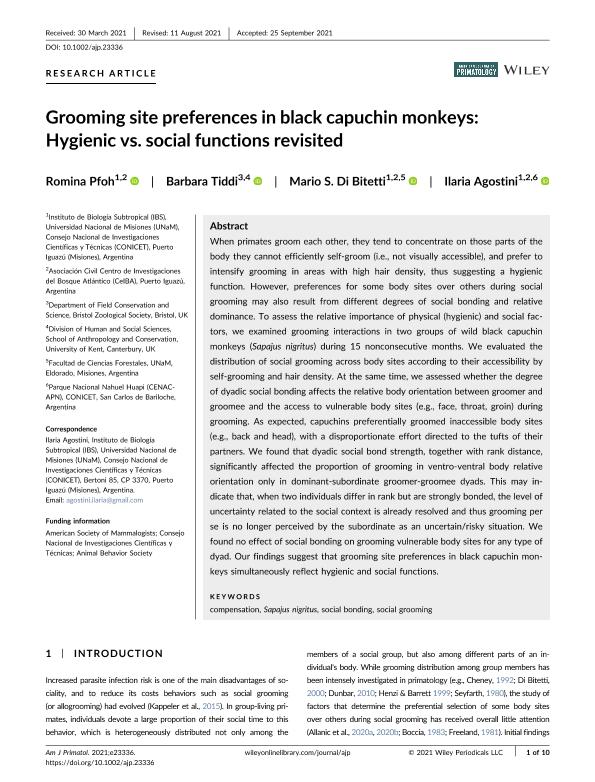Mostrar el registro sencillo del ítem
dc.contributor.author
Pfoh, Romina Vanesa

dc.contributor.author
Tiddi, Barbara

dc.contributor.author
Di Bitetti, Mario Santiago

dc.contributor.author
Agostini, Ilaria

dc.date.available
2022-09-06T11:35:27Z
dc.date.issued
2021-10
dc.identifier.citation
Pfoh, Romina Vanesa; Tiddi, Barbara; Di Bitetti, Mario Santiago; Agostini, Ilaria; Grooming site preferences in black capuchin monkeys: Hygienic vs. social functions revisited; Wiley-liss, div John Wiley & Sons Inc.; American Journal Of Primatology; 83; 12; 10-2021; 1-10
dc.identifier.issn
0275-2565
dc.identifier.uri
http://hdl.handle.net/11336/167478
dc.description.abstract
When primates groom each other, they tend to concentrate on those parts of the body they cannot efficiently self-groom (i.e., not visually accessible), and prefer to intensify grooming in areas with high hair density, thus suggesting a hygienic function. However, preferences for some body sites over others during social grooming may also result from different degrees of social bonding and relative dominance. To assess the relative importance of physical (hygienic) and social factors, we examined grooming interactions in two groups of wild black capuchin monkeys (Sapajus nigritus) during 15 nonconsecutive months. We evaluated the distribution of social grooming across body sites according to their accessibility by self-grooming and hair density. At the same time, we assessed whether the degree of dyadic social bonding affects the relative body orientation between groomer and groomee and the access to vulnerable body sites (e.g., face, throat, groin) during grooming. As expected, capuchins preferentially groomed inaccessible body sites (e.g., back and head), with a disproportionate effort directed to the tufts of their partners. We found that dyadic social bond strength, together with rank distance, significantly affected the proportion of grooming in ventro-ventral body relative orientation only in dominant-subordinate groomer-groomee dyads. This may indicate that, when two individuals differ in rank but are strongly bonded, the level of uncertainty related to the social context is already resolved and thus grooming per se is no longer perceived by the subordinate as an uncertain/risky situation. We found no effect of social bonding on grooming vulnerable body sites for any type of dyad. Our findings suggest that grooming site preferences in black capuchin monkeys simultaneously reflect hygienic and social functions.
dc.format
application/pdf
dc.language.iso
eng
dc.publisher
Wiley-liss, div John Wiley & Sons Inc.

dc.rights
info:eu-repo/semantics/openAccess
dc.rights.uri
https://creativecommons.org/licenses/by-nc-sa/2.5/ar/
dc.subject
COMPENSATION
dc.subject
SAPAJUS NIGRITUS
dc.subject
SOCIAL BONDING
dc.subject
SOCIAL GROOMING
dc.subject.classification
Zoología, Ornitología, Entomología, Etología

dc.subject.classification
Ciencias Biológicas

dc.subject.classification
CIENCIAS NATURALES Y EXACTAS

dc.title
Grooming site preferences in black capuchin monkeys: Hygienic vs. social functions revisited
dc.type
info:eu-repo/semantics/article
dc.type
info:ar-repo/semantics/artículo
dc.type
info:eu-repo/semantics/publishedVersion
dc.date.updated
2022-08-30T20:02:26Z
dc.journal.volume
83
dc.journal.number
12
dc.journal.pagination
1-10
dc.journal.pais
Estados Unidos

dc.description.fil
Fil: Pfoh, Romina Vanesa. Consejo Nacional de Investigaciones Científicas y Técnicas. Centro Científico Tecnológico Conicet - Nordeste. Instituto de Biología Subtropical. Instituto de Biología Subtropical - Nodo Puerto Iguazú | Universidad Nacional de Misiones. Instituto de Biología Subtropical. Instituto de Biología Subtropical - Nodo Puerto Iguazú; Argentina
dc.description.fil
Fil: Tiddi, Barbara. University Of Kent; Reino Unido
dc.description.fil
Fil: Di Bitetti, Mario Santiago. Consejo Nacional de Investigaciones Científicas y Técnicas. Centro Científico Tecnológico Conicet - Nordeste. Instituto de Biología Subtropical. Instituto de Biología Subtropical - Nodo Puerto Iguazú | Universidad Nacional de Misiones. Instituto de Biología Subtropical. Instituto de Biología Subtropical - Nodo Puerto Iguazú; Argentina
dc.description.fil
Fil: Agostini, Ilaria. Consejo Nacional de Investigaciones Científicas y Técnicas. Centro Científico Tecnológico Conicet - Nordeste. Instituto de Biología Subtropical. Instituto de Biología Subtropical - Nodo Puerto Iguazú | Universidad Nacional de Misiones. Instituto de Biología Subtropical. Instituto de Biología Subtropical - Nodo Puerto Iguazú; Argentina
dc.journal.title
American Journal Of Primatology

dc.relation.alternativeid
info:eu-repo/semantics/altIdentifier/doi/http://dx.doi.org/10.1002/ajp.23336
Archivos asociados
